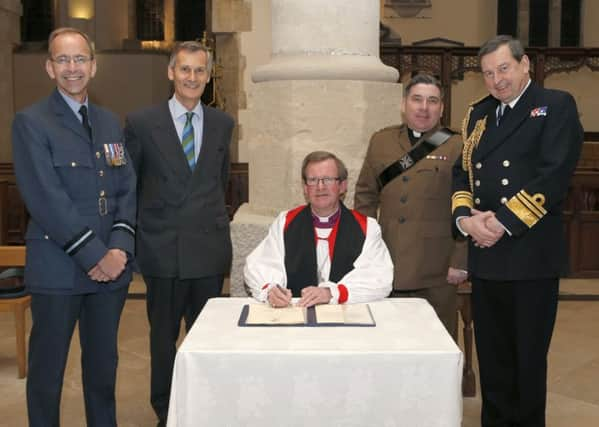'˜We're committed to supporting our troops' says Portsmouth Diocese


At Portsmouth Cathedral in Old Portsmouth, the Portsmouth Anglican Diocese signed the Armed Forces Covenant – an agreement between the church and armed forces to ensure that forces personnel and their families are treated equally to everyone else.
The Armed Forces Covenant was initially created as a way for the nation to promise to treat serving and former military personnel and their families fairly in areas such as education, housing and healthcare.
Advertisement
Hide AdAdvertisement
Hide AdNational and local government, as well as individual businesses, charities and organisations can sign up to pledge their support.
The covenant itself is not something that has to be renewed on a frequent basis; instead, it is a permanent agreement.
At Portsmouth Cathedral’s service of Evensong on Tuesday evening, the covenant was signed by Bishop Christopher Foster, Lord Lieutenant of Hampshire Nigel Atkinson, Second Sea Lord Vice Admiral Jonathan Woodcock, Air Commodore Alan Opie and the Rev Father Ian Stevenson.
Bishop Christopher Foster said: ‘The people of Portsmouth have a long and good relationship with the armed forces.
Advertisement
Hide AdAdvertisement
Hide Ad‘There are many who live in the area who have armed forces connections – so this covenant is really aimed at them.
‘Many former members of the services live in the parts of the country we serve.
‘As the lead bishop for defence it has been a personal pleasure to support the covenant, including initiating a debate in the House of Lords following the last annual report on the covenant.
‘It feels great to have signed the covenant and to remind us of the sacrifices made by service personnel.
Advertisement
Hide AdAdvertisement
Hide Ad‘This Armed Forces Covenant will last forever and we are really looking forward to upholding the principles of it.
‘I know that Portsmouth City Council has its own covenant, but we are now able to focus on what we can do for the families of the armed forces going forward.’
Second Sealord Vice Admiral Jonathan Woodcock says that the diocese’s support can make a huge difference.
He said: ‘There are many examples where covenants with organisations and local companies have given people the support that they need.
Advertisement
Hide AdAdvertisement
Hide Ad‘The covenant does many things – it supports the employment of veterans, supporting workers who choose to be members of the reserve forces and asking church schools to adopt admissions policies to make it easier for service family children to get school places, among others.
‘It was a real pleasure to be able to come to Portsmouth Cathedral and sign the Armed Forces Covenant – it is a wonderful thing for them to do and to have both the bishop and Lord Lieutenant here was very special indeed.’
THE COVENANT
THE armed forces covenant was first introduced in the UK at the turn of the century.
There has been an agreement between government and the armed forces since 1593, when Queen Elizabeth I ordered for taxes on parishes not to exceed 6d on the pound, for the benefit of disabled military veterans.
Advertisement
Hide AdAdvertisement
Hide AdThe Armed Forces Covenant itself, which was first introduced in April 2000, is something that was originally pushed for by the army – eventually encompassing all facets of the armed forces.
The Armed Forces Covenant aims to recognise the value of serving personnel – both regular and reservists – as well as veterans and military families that contribute to society.
It reads: ‘The whole nation has a moral obligation to the members of the Naval Service, the Army and the Royal Air Force, together with their families. They deserve our respect and support, and fair treatment.’
In March 2012, Portsmouth City Council signed the Armed Forces Covenant, with local authorities across the UK doing the very same thing.
Those present at the signing were the Commodore of HM Naval Base Portsmouth, the Commander of 145 South Brigade and the head of RAF recruiting.